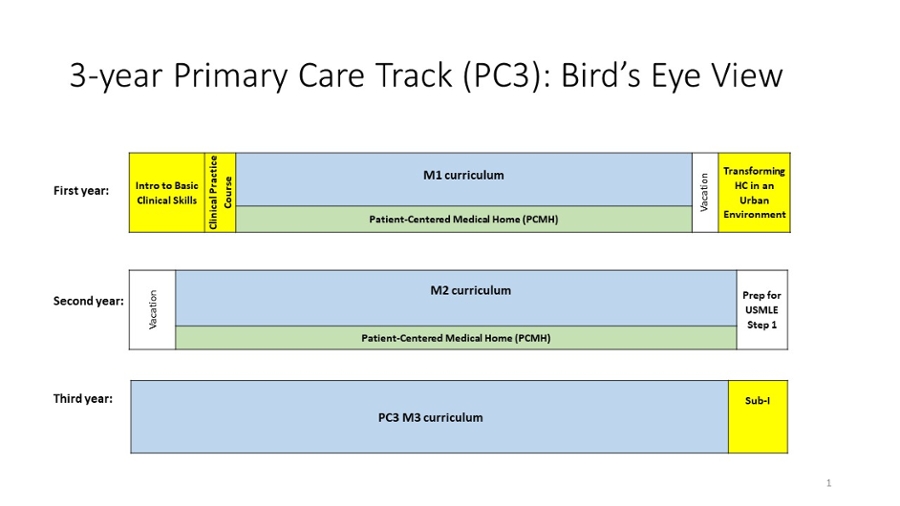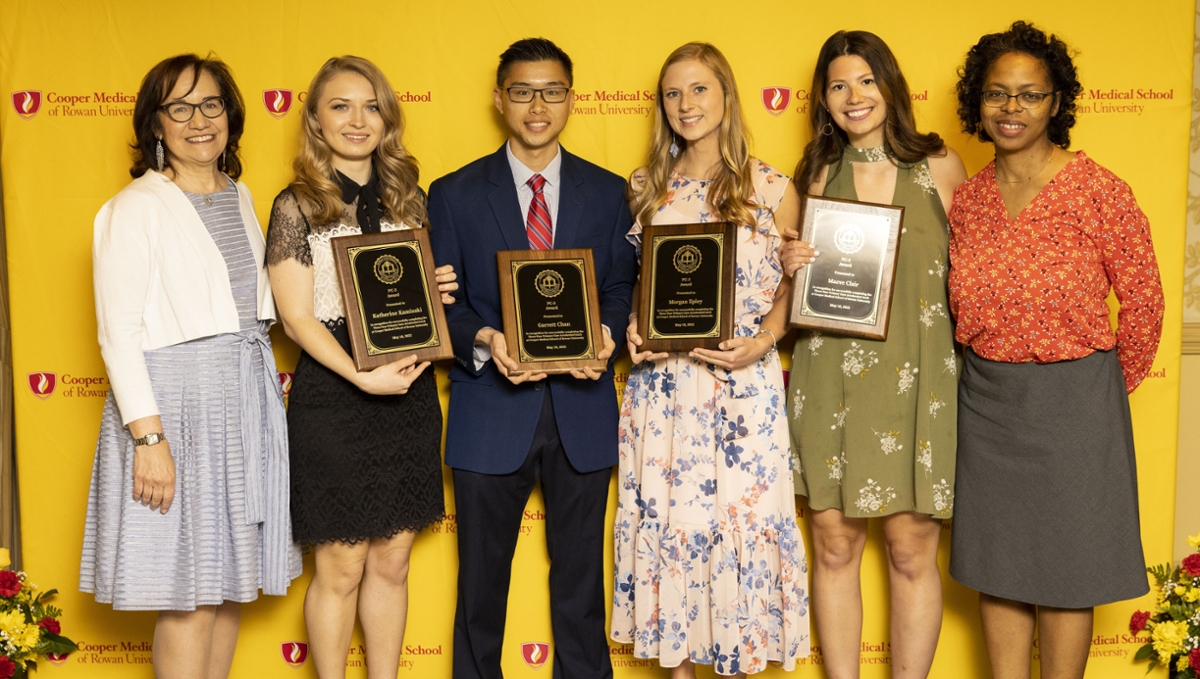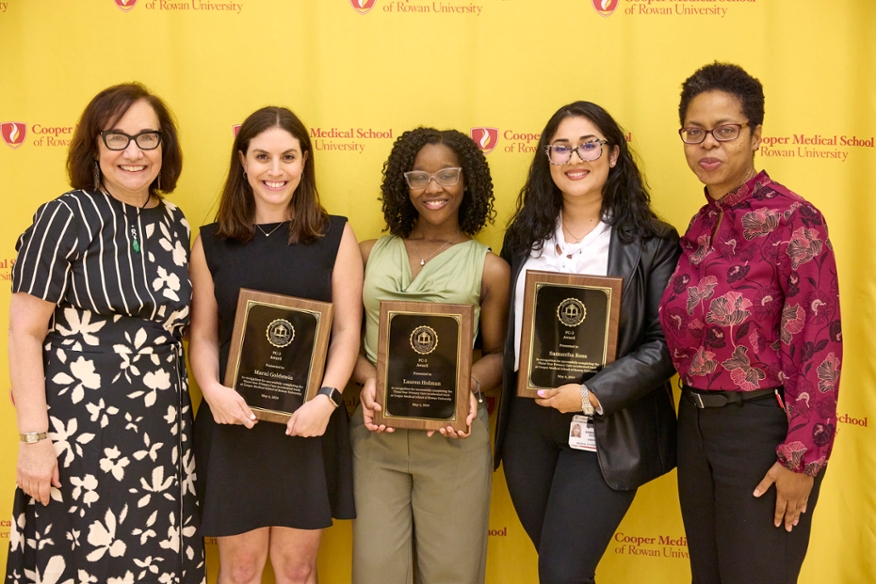MD Program: Accelerated Three-Year Primary Care Track (PC3 Track)
Below, you will find an outline of the program structure of the Accelerated Three-Year Primary Care Track program offered at Cooper Medical School of Rowan University (CMSRU).

Program Structure
Year one (M1)
Students in the PC3 track start the year six weeks before their colleagues, with a unique course titled, "Introduction to Basic Clinical Skills." This course is designed to provide new medical students with fundamental concepts in medical communication, history-taking and physical diagnosis. The skills learned in this course will be put to use from the start of the first year. They will then take a one-week course called the "Clinical Practice Course," which is a clinical immersion experience that provides early opportunities to practice clinical skills with outpatients in primary care and subspecialty offices.
PC3 students spend a half-day every month at an NCQA-recognized Patient Centered Medical Home Clinic in Camden in their respective disciplines. Students work directly with their primary care faculty preceptor to engage in coordinated patient-centered care as part of a multidisciplinary team. PC3 students will also spend time in this clinic in their M3 year during a longitudinal rotation.
All other academic experiences in the M1 year match the "traditional" four-year medical education program.
At the end of the M1 year, after a short break, PC3 students participate in a five-week course titled, "Transforming Healthcare in an Urban Environment." This course provides medical students with fundamental knowledge and experience delivering healthcare in underserved urban communities like Camden. The building blocks of this course are designed to explore and address barriers to care using innovative models of healthcare delivery. Through experiential learning, students build their knowledge of social determinants of health and healthcare disparities, public health advocacy, and policies impacting urban health, healthcare for the homeless, trauma-informed care and more. Students also learn how teams at Cooper University Health Care and in the Camden community are transforming healthcare in diverse communities with complex medical and psychosocial needs.
Year two (M2)
Students in the PC3 track continue to participate monthly in the Patient Centered Medical Home clerkship, with increased responsibilities and independence, as well as additional exposure to population health management and behavioral health resources within primary care.
PC3 students take their USMLE Step 1 examination at the end of their second year along with their colleagues following the "traditional" four-year medical education program.
Year three (M3)
The third year is redesigned for those students enrolled in the PC3 track.
During the fall and winter, PC3 students have four-week clerkship blocks (Surgery, Internal Medicine, Neurology, Psychiatry, Obstetrics and Gynecology, Pediatrics and Family Medicine/Adult Primary Care). Some blocks have additional outpatient time built in, but the PC3 students have exposure to the same "core" clerkships as do the "traditional" four-year students. Although PC3 schedules are different from the traditional track, PC3 students are paired together within their rotations and will be in clinical teams and in didactic settings with their fellow students from the traditional track.
During the spring, PC3 students spend 11 continuous weeks in a longitudinal outpatient rotation called CLOC (Cooper Longitudinal Outpatient Clerkship). They spend their CLOC rotation honing their clinical skills. Students in the PC3 track spend one half-day a week one-on-one with attending physicians in each of six areas: Neurology, Internal Medicine, Pediatrics, Surgery, Psychiatry and Obstetrics-Gynecology. The CLOC experience is only available within the PC3 track.
The Step 2 CK examination is scheduled after the core clerkships. Students will have special faculty-led review sessions over the summer and fall to prepare for this.
The year ends with a four-week subinternship in the student's chosen discipline (Family Medicine, Internal Medicine, or Pediatrics), prior to entering residency training. During the subinternship, a senior medical student takes on the clinical responsibilities of an intern on an inpatient medical team, under the close supervision of a senior resident and attending physician. This ensures that each student's clinical skills are at their peak prior to starting residency.
Program Highlights
The PC3 Track has a Directed Pathway to residency in one of 3 primary Care residency programs/tracks: Family Medicine, Primary Care Pediatrics and Primary Care Internal Medicine.
Primary Care Internal Medicine at Inspira Medical Center in Vineland
The Inspira Medical Center in Vineland [https://www.vinelandcity.org/welcome/] serves Cumberland County [ https://explorecumberlandnj.com/] in the most Southwest part of New Jersey. Cumberland County is known as the “Garden Spot” in the Garden State and is home to rural communities and many family-owned farms. Cumberland County, NJ, is a great place for students and Internal Medicine residents interested in Primary Care. It is a federally designated medically underserved area with physician shortages in primary care. Training here exposes learners to real-world health disparities, making their work highly impactful. Residents in the Primary Care Track have additional months of outpatient clinical rotations in each year of residency which allows them to establish long term relationships with patients in their community.
Click here for further information on the Inspira-Vineland Primary Care Track in our Residency FAQ section.
Click Here for additional information on the Inspira-Vineland Internal Medicine residency Program
Click here to check out the Internal Medicine residency program on Instagram.
Family Medicine Residency at Cooper University Health Care
Residents in the Family Medicine Residency program train in the full scope of medicine from inpatient and ambulatory settings, to labor and delivery as well as emergency care. Residents work with patients from newborns to the elderly. While they learn the breadth of medicine they also choose concentration tracks from among 12 clinical spheres, including Marginalized Communities, Addiction Medicine, Media and Advocacy among others.
Click here for additional information on the Cooper Family Medicine Residency Program.
Click here to check out the Family Medicine Residency Program on Instagram.
Pediatric Residency Primary Care track at Cooper University Health Care
Residents in the Pediatric Residency Primary Care track engage in advocacy experiences working with children in Juvenile Detention; with special-needs children in school settings; and on health education projects in a local Camden school. With 6 months of outpatient time per year, there is ample opportunity for outpatient time for clinical experiences in subspecialty clinics, and research projects as well as dedicated primary care didactic time. Residents have clinical months in Adolescent Medicine and Developmental/Behavioral Pediatrics, as well as exposure to Pediatric Emergency Medicine. Senior Pediatric Residents also have the opportunity to pursue a global health experience during their training.
Click here for additional information on the Cooper Pediatrics Residency Program and Primary Care Track.
Click here to check out the Pediatric Residency Program on Instagram.
Internal Medicine Residency Primary Care Track at Cooper University Health Care
Residents in the Internal Medicine Residency Primary Care Track experience additional outpatient clinical time; dedicated Primary Care didactics; elective opportunities in HIV Care, Addiction Medicine, Women’s Health and outpatient subspecialty clinics. Residents also provide care outside the office setting via home visits, rounding in subacute rehabilitation centers and via telephone medicine. Senior Internal medicine residents may also participate in Cooper’s Global Health Initiative in Ghana
Click here for additional information on the Cooper Internal Medicine Residency Program and Primary Care Track.
Click here to check out the Internal Medicine Residency Program on Instagram.


